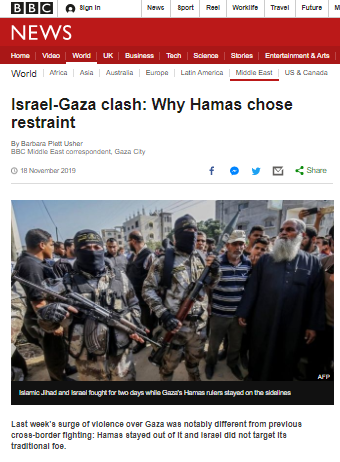On November 18th the BBC News website published an article by Barbara Plett Usher titled “Israel-Gaza clash: Why Hamas chose restraint”.
Plett Usher began with two inaccurate statements, one of which she later repeated.
“Last week’s surge of violence over Gaza was notably different from previous cross-border fighting: Hamas stayed out of it and Israel did not target its traditional foe. […]
Hamas, which governs Gaza, did participate in a joint operations room with other factions to discuss tactics. But it conspicuously did not launch any attacks.”
So did Hamas really ‘stay out of it’? Not exactly, according to Israeli officials:
“Hamas terror organization is responsible for the launch of two rockets at the southern city of Be’er Sheva overnight, sources in the defense establishment said Saturday. […]
Military officials estimate the launch was carried out by low-level Hamas militants on the ground, contrary to the position of the organization’s leadership that wants to put the latest flare-up behind them.”
And did Israel “not target its traditional foe”? Again, that claim is inaccurate.
“Israel struck Hamas targets in Gaza after Palestinians launched two rockets towards the southern Israeli city of Beersheba early on Saturday morning. The IDF believes Hamas was responsible for firing the rockets. […]
In retaliation the Israeli military said it struck a military camp, a compound for the group’s naval forces and underground terror infrastructure.”
Plett Usher went on to claim that the PIJ is “more radical” than Hamas.
“Paradoxically it confirmed that Israel and Hamas – Gaza’s main Islamist movement – are committed to pursuing strategic understandings to help keep the peace.
The fighting started when Israel carried out what it called the targeted killing of a top commander in the smaller, more radical Islamic Jihad group, claiming he was planning attacks that posed an imminent threat.”
Of course both the PIJ and Hamas are Islamist groups which reject Israel’s existence, strive for its eradication by means of terrorism and reject any efforts to resolve the conflict through negotiation. Plett Usher however did not trouble her readers with the finer points of either terrorist organisation’s ideology before extensively – and uncritically – quoting an official from Hamas’ ‘international relations office’. [emphasis added]
“That is because it was “in the Palestinian interest” to avoid an escalation, a senior Hamas official, Basem Naim, told the BBC. Gazans were already suffering enough due to dire conditions on the ground, he said, and “the regional and international atmosphere is not so helpful at this time”. […]
Basem Naim played down the differences between the two groups. He insisted Hamas had not abandoned its commitment to armed resistance against the Israeli occupation, what Israel and many Western countries call terrorism.
“Maybe we, based on our interests, sometimes decide to postpone or decrease our response [to Israeli strikes], but that doesn’t mean we don’t have the right to continue our struggle,” he said. “It is not our role to work as a police force for the occupation, and if we have to decide internally to stop, this is based on Palestinian dialogue, not a response to Israeli wishes or plans.””
Plett Usher of course did not bother to explain to BBC audiences that what Hamas means by “Israeli occupation” is the existence of Israel itself or that Israel withdrew every last soldier and civilian from the Gaza Strip fourteen years ago.
She did mislead readers with the claim that “Israel tightened its blockade of the Gaza Strip when Hamas reinforced its power there in 2007…” while failing to clarify that the Israeli security cabinet declared the Gaza Strip “hostile territory” in September 2007 – three months after Hamas’ violent take-over – due to a severe increase in terror attacks.
Plett Usher whitewashed twenty months of weekly violent rioting that regularly includes border infiltrations, shooting attacks, IED attacks, grenade attacks and arson attacks which have caused serious damage to thousands of acres of farmland and nature reserves in Israel as “protest marches”. She portrayed restrictions on the import of dual use goods and weapons to the Gaza Strip as “crippling” while failing to clarify that Israel facilitates the entry of thousands of tons of goods including medical supplies, food, fuel and building materials to the Gaza strip every week.
“But the trade-off is for Hamas to lower the temperature of weekly protest marches along Gaza’s border with Israel, and for Israel to ease its crippling blockade.”
Notably however, readers of this transparent amplification of Hamas’ narrative learned nothing of the long-standing tensions between Hamas and the Palestinian Islamic Jihad and the former’s failure to rein in Baha Abu al Ata which is the background to the recent round of conflict.
Related Articles:
BBC News avoids the word terror in report on strike on terrorist
‘Quite forthcoming with the confrontational approach’: guess what the BBC is describing
Rocket attacks on Israel prompt BBC WS interview with serial Gaza contributor
BBC R4’s Mishal Husain sells her listeners short with self-indulgence
BBC News website adheres zealously to editorial guidelines
BBC doublethink on display in report on rocket attacks
BBC abandons independent verification in reporting on Gaza casualties
What did BBC audiences learn from a PIJ leader interview?
BBC’s Tom Bateman frames ‘background’ to PIJ attacks
BBC’s Bateman misleads WS radio listeners on Israeli ‘policy’




